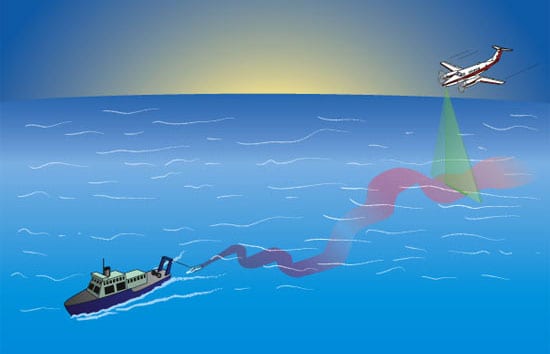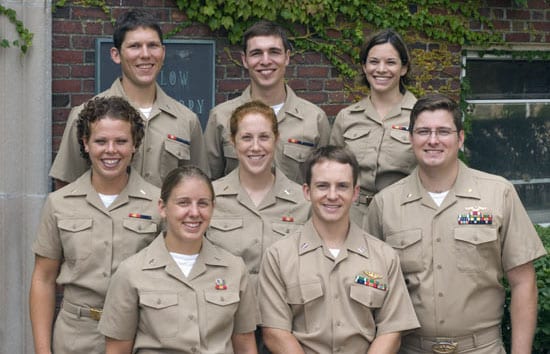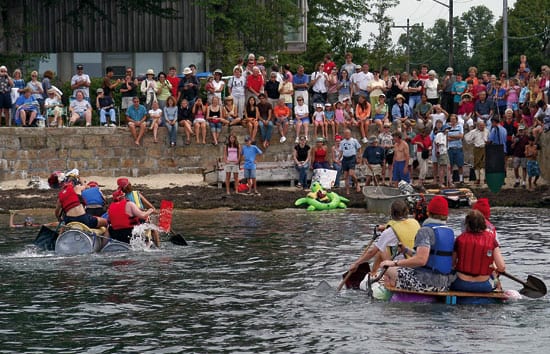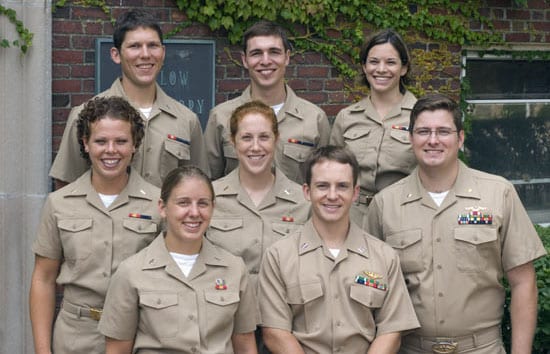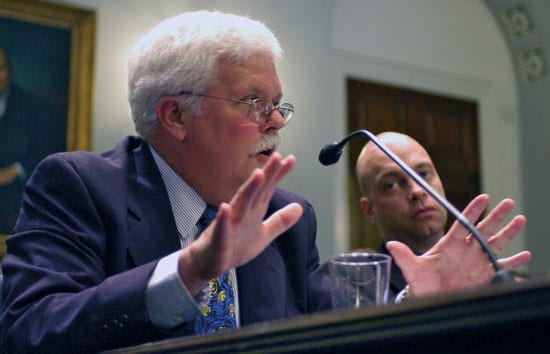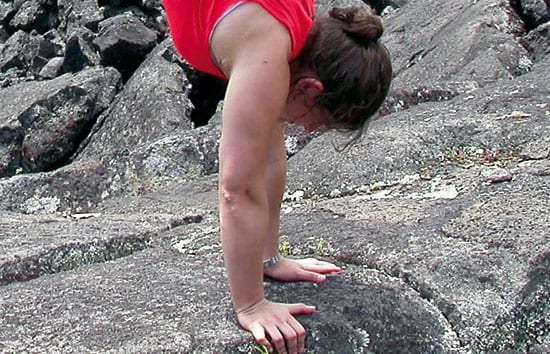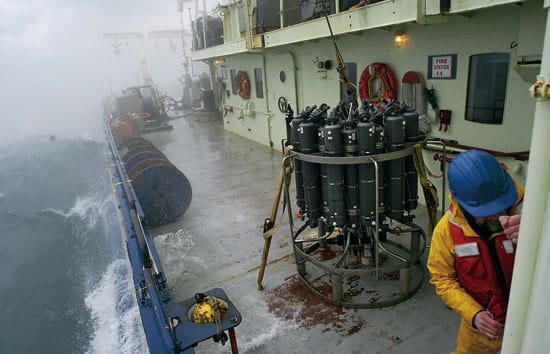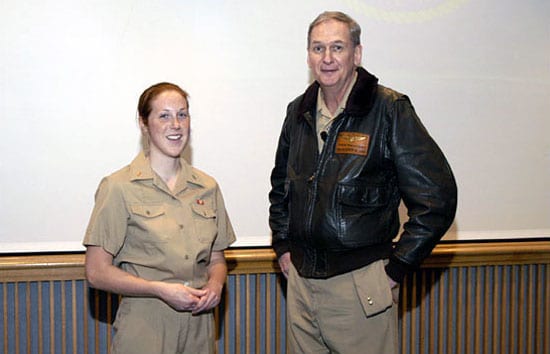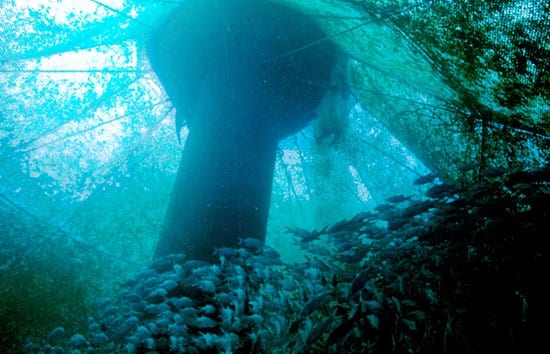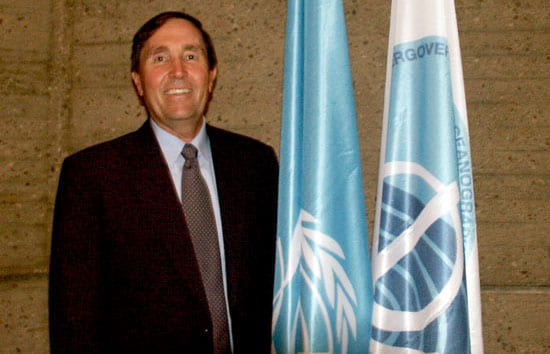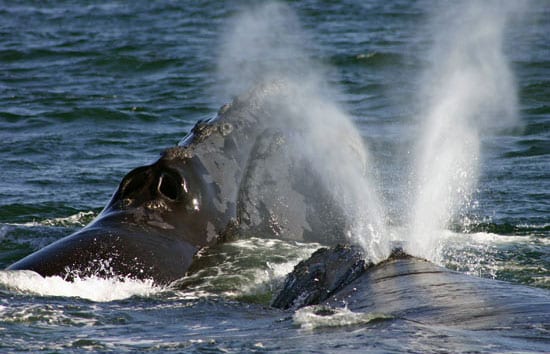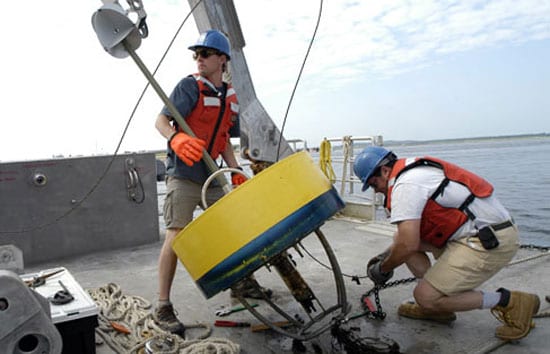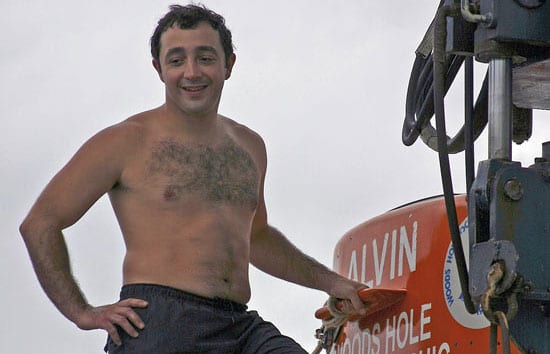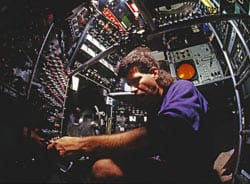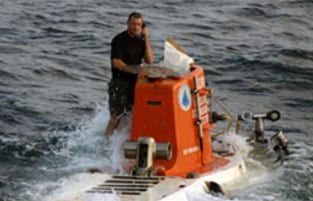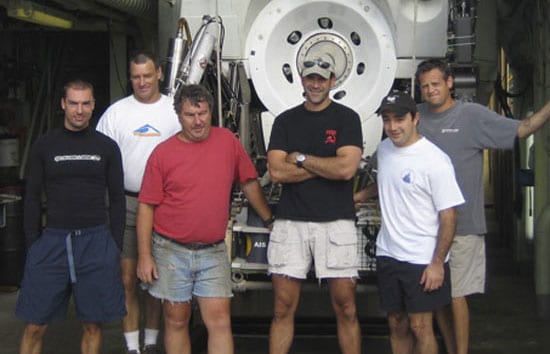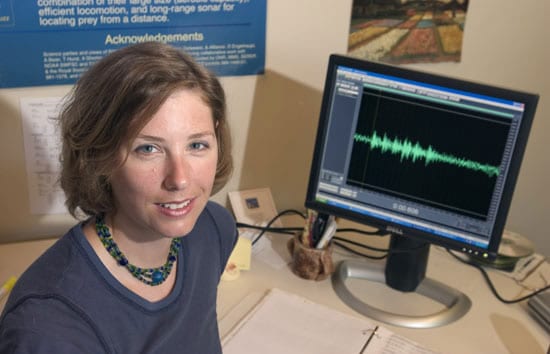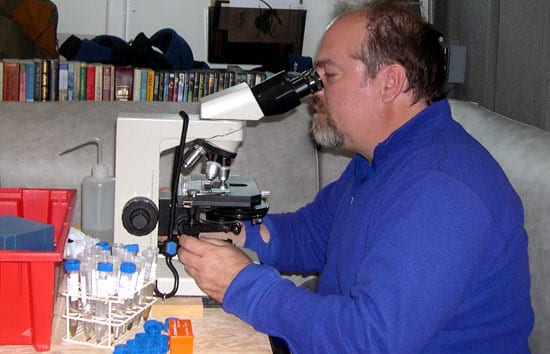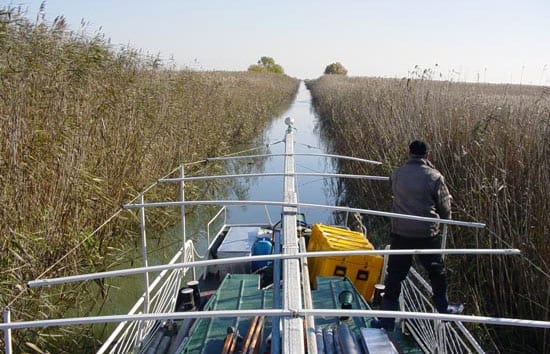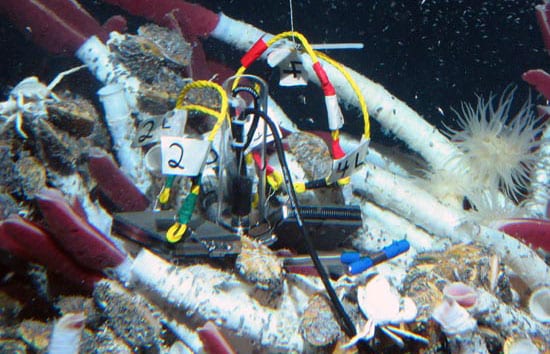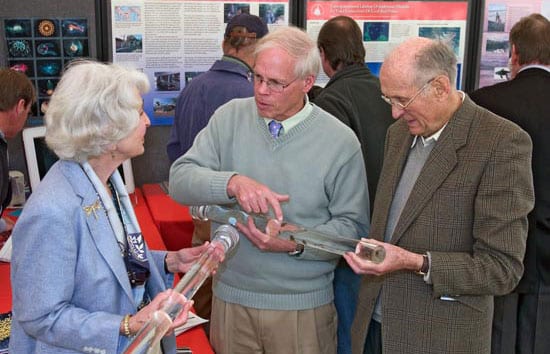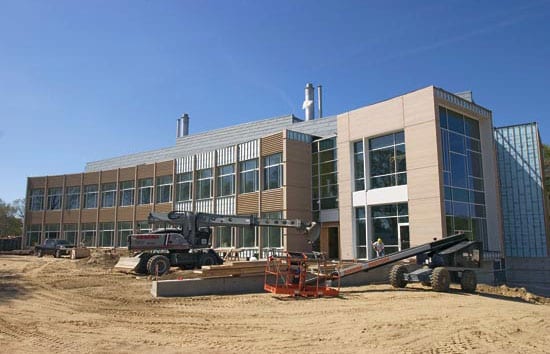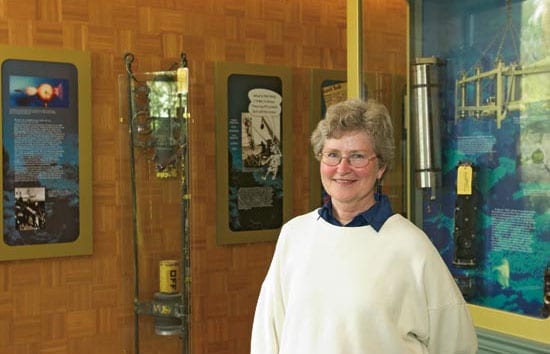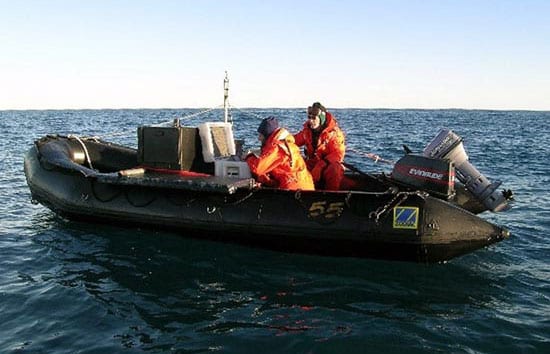Feature
An Experiment to Dye For
WHOI scientists are exploring an experimental technique to track the complex movements of water in the oceans using harmless fluorescent dyes and airplanes equipped with Light Detection and Ranging instruments. To detect motion, LIDAR uses pulses of laser light, which cause the flowing dye to fluoresce.
Read MoreAn Officer and a Graduate Student
Six hundred eighty-two students have earned master?s and doctoral degrees since the MIT/WHOI Joint Program in Oceanography/Applied Ocean Science and Engineering began in 1968. After shaking hands and accepting their diplomas, 61 of them took off their academic robes and put their Navy uniforms back on. Nine more will do so in the next two years.
Read MoreAnything-But-A-Boat Regatta
Shoveling and splashing toward a finish line ringed with spectators in Woods Hole, WHOI employees and students revived a tradition this summer: the Anything-But-A-Boat Regatta, which was first run to celebrate WHOI?s 50th year in 1980.
Read MoreMeet the Class of 2005-2007
Nine U.S. Navy officers are pursuing graduate degrees in the MIT/WHOI Joint Program in Oceanography/Applied Ocean Science and Engineering through a special arrangement between the institutions.
Read MoreJoyce, Evans Give Testimony on Oceans to Congress
WHOI scientists Rob Evans and Terry Joyce testified June 8 before the House Subcommittee on Fisheries and Oceans, chaired by Wayne Gilchrest (R-Md.) in a continuing effort to help educate the U.S. House of Representatives on the oceans.
Read MoreCartwheeling Grad Student Earns Panteleyev Award
Margaret Boettcher knows a fast stress reliever: turn upside down. “Handstands and cartwheels make people happy,” said Boettcher, who has taught fellow WHOI graduate students and postdoctoral researchers her relaxation…
Read MoreWhere Currents Collide
In January 2005, a research cruise set out aboard R/V Oceanus for the tumultuous witnertime waters off Cape Hatteras—aptly nicknamed “the graveyard of the Atlantic.” During three weeks riding the waves, WHOI Research Associate Chris Linder kept a journal with pen and camera that includes “relentless North Atlantic storms battering our ship, instrument retrievals in the dead of night with blue water washing over the rail, and science gear shattered by 20-foot waves.”
Read MoreDouble Duty for Ensign/Student Allison Berg
Ensign Allison Berg won the first Pittenger Fellowship for naval officers in MIT/WHOI Joint Program. In collaboration with WHOI Research Specialist Eugene Terray, Berg will conduct a field experiment using Sonic Detection and Ranging (SODAR) systems to study winds near the ocean?s surface.
Read MoreA Whole New Kettle of Fish
With most of the world?s fisheries already fully exploited or overexploited, the wild catch will not meet increasing worldwide demand for seafood?which the U.S. Department of Commerce projects will triple by 2025. The United States also imports nearly 70 percent of the seafood Americans consume, resulting in an $8 billion shellfishing industry trade deficit.
Read MoreAnderson Addresses UN Ocean Commission
Senior Scientist Don Anderson of the WHOI Biology Department was invited to deliver the Bruun Memorial Lecture in June at the 23rd annual meeting of the Intergovernmental Oceanographic Commission (IOC) of the United Nations Educational, Social, and Cultural Organization (UNESCO).
Read MoreIn and Out of Harm’s Way
Just a few more miles or a few more minutes. That’s what scientists and some federal managers think it would take to improve the plight of the highly endangered North…
Read MoreAt the River’s End
In science, some of the most confounding and interesting questions come from the borderlands, where one physical world collides with another. In marine science, one of the most dynamic environments…
Read MoreWhat Is the Alvin Training Program Like?
Like many boys who spend their youths throwing baseballs in Massachusetts parks, Tarantino dreamed of playing for the Red Sox. When not pitching, he liked to take apart his toys…
Read MoreLife After Alvin
‘Ever Get Scared in the Sub?’ and Other Questions
Alvin‘s Pilots
Forty summers ago in the Bahamas, two men climbed inside a 23-foot white submarine named Alvin and drove it to a depth 6,000 feet, a dive that certified them as…
Read MoreA Whale Expert is Called in to Decipher Odd Elephant Calls
An article about work done by WHOI postdoctoral investigator Stephanie Watwood to analyze atypical sounds made by two African elephants, one imitating a truck and one the calls of another elephant species
Read MoreRed TideGone for Now, But Back Next Year?
The historic bloom of toxic algae that blanketed New England’s waters and halted shellfishing from Maine to Martha’s Vineyard in the spring of 2005 is over. But scientists are now wondering if there will be an encore.
Before departing, the algae likely left behind a colonizing population that may promote blooms in southern New England for at least the next few years.
The Once and Future Danube River Delta
?The Danube River Delta is like the Everglades,? said Liviu Giosan, who grew up near the Romanian wetlands. The triangle-shaped, sediment-rich region at the mouth of the Danube River is also rich with human history. A traditional maritime culture persists on the delta, and the United Nations has declared the region a World Heritage site. The Danube Delta is also a great place for a geologist to study how the coast stretches, contracts, and undulates with time?and human interference.
Read MoreSettling on the Seafloor
People may search for a long time, but they know it when they see it—the right job in the right town, or the right house in the right neighborhood. Then…
Read MoreA Tropical Research Paradise
WHOI Trustees Frank and Lisina Hoch have issued a one-to-one $1.125 million challenge to seize new opportunities and expand the Institution’s research in tropical regions.
Read MoreWHOI Announces $200 Million Capital Campaign
article about WHOI’s capital campaign
Read MoreInstitution Celebrates 75th Birthday in 2005
WHOI celebrates 75 years of ocean research, education, and exploration this year with several events planned for August and September.
Read MoreSeafloor Reconnaissance Reveals Hidden Dangers Off Antarctica
For five frigid weeks in April and May 2005, a team of scientists and engineers sat in inflatable boats off the coast of the western Antarctic Peninsula, steering clear of…
Read More
